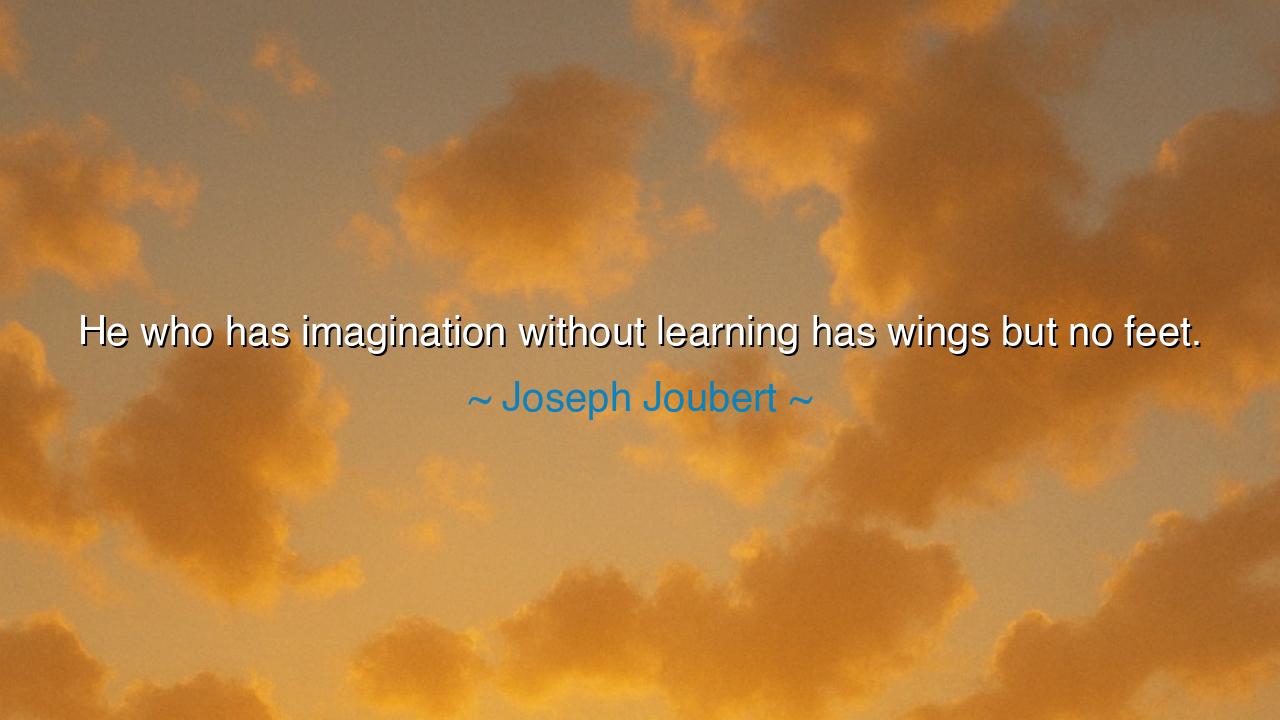
He who has imagination without learning has wings but no feet.






When Joseph Joubert wrote, “He who has imagination without learning has wings but no feet,” he spoke as a philosopher of the soul—a man who had tasted the ecstasy of vision and the discipline of knowledge. His words are both a celebration and a warning. They remind us that imagination, though divine in its fire, must be joined with learning, that sacred grounding of wisdom, if it is to bring forth creation rather than chaos. For the one who dreams without understanding may soar gloriously for a time, but will find no place to land. He will glide through the heavens of fancy, yet remain forever unrooted in truth.
This saying was born in the age of enlightenment, when men like Joubert sought harmony between intellect and inspiration, between the mind that reasons and the heart that dreams. To him, the human spirit was like a bird: it requires both the power to rise and the strength to stand. Imagination gives the wings—the lift that carries one beyond the boundaries of the known, into the realm of discovery and art. But learning gives the feet—the wisdom to return, to apply, to build what the mind has envisioned. Without learning, imagination may dazzle the sky, but it will vanish like smoke, leaving behind no monument, no fruit of its flight.
Consider the tale of Leonardo da Vinci, that eternal flame of the Renaissance. His imagination soared farther than the stars—he envisioned flying machines, machines of war, the very anatomy of the heavens. Yet it was his learning, his tireless study of nature, mathematics, and anatomy, that gave his imagination weight and form. Through knowledge, his dreams took root in sketches that foretold the coming age of invention. Da Vinci had both wings and feet, and thus he not only dreamed of flight but taught humanity how to take its first steps toward it.
But contrast this with the story of Icarus, from the myths of old. He, too, had wings—wings of wax and feather, born from the imagination of his father, Daedalus. Yet he lacked understanding, and when he flew too close to the sun, his wings melted, and he fell into the sea. Icarus is the eternal symbol of imagination ungoverned by wisdom, of vision unanchored by humility. Joubert’s words echo across the centuries as a gentle counsel: let the dreamer beware of the sky’s seduction. Without knowledge, the ascent becomes perilous; without reason, the flame that inspires can also consume.
Yet we must not mistake Joubert’s wisdom for scorn of the dreamer. He does not condemn imagination, for it is the light that moves humanity forward. Rather, he calls for its union with learning, so that the light might be shaped into lasting fire. The imagination without knowledge is like a river without banks—it floods, it dazzles, but it cannot be directed. When disciplined by study and reflection, imagination becomes not mere fantasy, but creation—the bridge between thought and reality.
There is great beauty in this balance. The mind that learns but does not dream becomes heavy and dull, chained by fact but untouched by wonder. The mind that dreams but does not learn becomes wild and fleeting, full of visions that vanish at dawn. The greatness of the human spirit lies in the marriage of the two—in the scholar who dreams and the dreamer who studies. From such union arise the poets who write truth, the inventors who shape the world, and the leaders who imagine a better tomorrow and know how to build it.
So remember, children of tomorrow: cultivate both your wings and your feet. Read deeply, question endlessly, learn from those who came before. But do not let your learning extinguish the fire of imagination that burns within you. Let knowledge be the ground from which your visions take flight, and let imagination be the wind that carries your understanding beyond the horizon. For when you join these two powers—the discipline of learning and the wonder of imagination—you will walk with wisdom upon the earth and soar with vision through the heavens.
And thus, the teaching of Joseph Joubert endures like a lamp through the ages: To imagine without learning is to dream without destiny. But to learn and imagine together—that is to live as both human and divine, both rooted and rising, both grounded and free.






AAdministratorAdministrator
Welcome, honored guests. Please leave a comment, we will respond soon